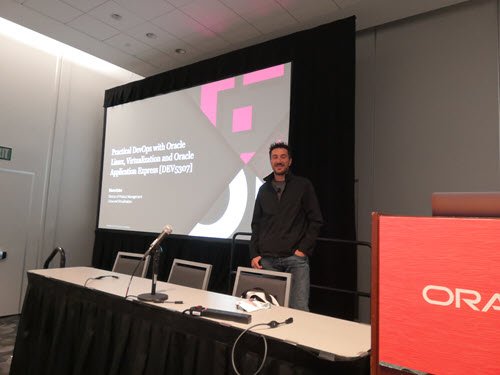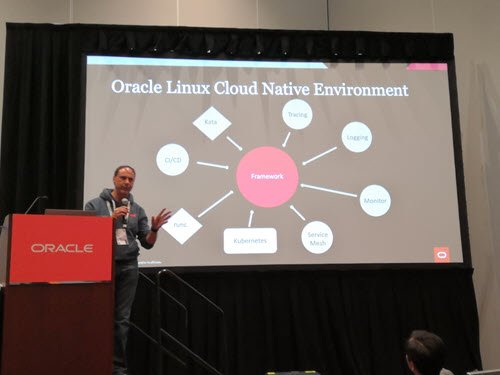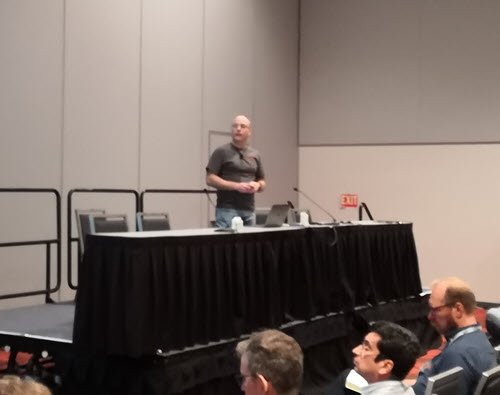I started Wednesday by trying to play catch-up with some of the keynotes. I don’t like going to them, but it’s important to hear what was said, because people often put their own spin on what was actually said to make it fit with their narrative.

From there I headed down to the conference to see Michael Hüttermann with “DevOps: State of the Union”. Michael managed to pull off a session where we did all the talking. How does that work? 🙂 It was really good fun, and it was interesting to hear other people’s experiences, and how they define DevOps.

Next up was Simon Coter with “Practical DevOps with Linux, Virtualization, and Oracle Application Express. At the start of the session Simon started a Vagrant build using the “vagrant up” command, then continued with the session, describing how tools such as VirtualBox and Vagrant can help you build consistent environments. He then described this specific build and showed us the finished product. I think the session went really well, and if you follow the blog you know I’m a VirtualBox+Vagrant fan. The other thing worth mentioning was he showed how a VirtualBox VM can be exported to OCI, and maybe in future an OCI VM imported back into VirtualBox. The first of those two operations means you could use VirtualBox and Vagrant as your choice for custom infrastructure builds for the cloud. Interesting…
Next up was “Embracing Constant Technical Innovation in Our Daily Life”, which was a panel session made up of Gustavo Gonzalez, Sven Bernhardt, Debra Lilley, Francisco Munoz Alvarez and Me. We didn’t have a big crowd, but we did get some crowd participation. I find panels fun, and some of the practical suggestions included.
- Write stuff, and preferably put it out on the internet. Thinking someone might read it makes you up your game, and something like blogging can help some people with motivation to try out new stuff. (Writing Tips)
- Do presentations, because of the pressure of a deadline often makes you focus, and there is also a desire to present something new. Remember, presenting is not just about conferences. Get a group of people in your office and present stuff to the group. It’s a good skill to develop, improves your confidence and makes you more visible in the company and of course improves knowledge transfer! (Public Speaking Tips)
- When you get good at one thing, it makes it easier to learn new things. You understand the effort it takes and you know you have to look below the surface. (Learning New Things)
- Get involved with the community. A wise person learns by other people’s mistakes. Go to local meetups for subjects outside your main skill set, to give you a different perspective. It might reinforce your beliefs or challenge them.

After that it was off to see “Understanding the Oracle Linux Cloud Native Environment (OLCNE)” with Wiekus Beukes, Tom Cocozzello and Thomas Tanaka. Oracle have built a tool that allows you to install, manage and upgrade selected Cloud Native Computing Foundation projects. That tool is called OLCNE. Why is this important? Because there are loads of CNCF projects, with a load of dependencies, so trying to install, and more importantly upgrade them, can be a nightmare. This tool will make that easier, as it will manage dependencies, and keep track of which versions of project X are certified with which versions of project Y. All these versions will be tested by Oracle to make sure things just work. The idea being you want Kubernetes + CRI-O + Prometheus + Istio? Sorted. For someone like me, who is a complete noob at most of this, that is a really interesting proposition. The project will be open sourced and on GitHub. Once it gets enough non-Oracle people contributing to the project, they hope to submit it to CNCF. Maybe we are seeing the start of how to manage CNCF projects in the future?? 🙂

After that I went to see Colm Divilly speaking about “Database Management REST APIs”. The management APIs were introduced a couple of versions ago, but with each release they are adding more stuff. We now have integration with the DBCA for instance and PDB lifecycle management, as well as APIs to control features like Data Pump and get performance monitoring information. I really need to spend some time paying with these, because it’s a great way to automate operations and make them available to other people. I like to think of it as breaking down the walls of the silo by presenting what you do as a service.
Once that session was over I spent a few minutes talking to the ORDS and SQL Dev folks, then it was back to my hotel to crash. I ducked out of the concert (the ticket went to a good home) and other invites because I am old and my bed was calling me.
That was my last day at OpenWorld. I leave Thursday morning US time and will be back home at some point on Friday UK time. I’ll no doubt do a post about the journey home and a wrap-up post once I get back.
Cheers
Tim…